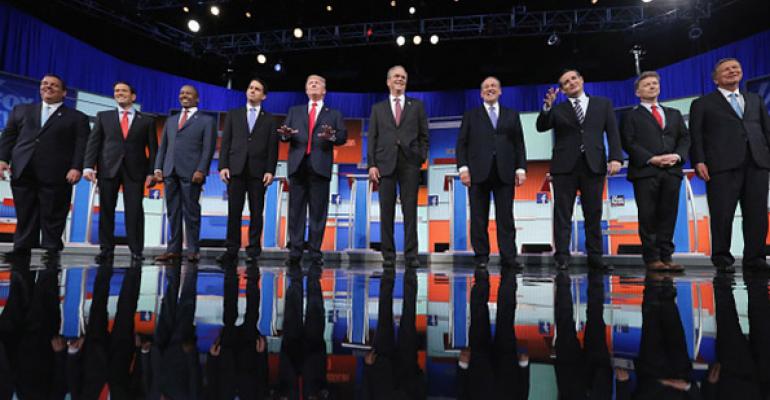
We are just over a year out from the general election and only a few months from the official start of the presidential primary season. With over a dozen candidates competing on the Republican side and the Democrats slowly but methodically coalescing around Hillary Clinton, the path ahead to our next president is somewhat hazy. For business operators, fighting through the rhetoric to identify a candidate that actually knows what a profit and loss statement looks like, comprehends the pressures entry-level employers face, and understands the important role in the economy these businesses play can be a challenge.
As a veteran of the public policy space with regard to the restaurant industry, clearing up some of that haze when it comes to understanding candidates and elected officials is what I have spent more than two decades doing. Putting aside my personal politics, it’s my intent here to use that experience to help readers identify who may be the best “small business candidate.”
First, a disclaimer: In my desire to accomplish this task without offending anyone, I am all but guaranteed to offend someone. So, consider this my apology in advance. Here goes.
The Democratic side is quite a bit easier to reconcile. Former Senator and Secretary of State Hillary Clinton is still the obvious frontrunner. And, her record on business issues is fairly straightforward. She has been considered “pro-business” if you happen to be in the tech or financial services sectors. If you’re not from Silicon Valley or Wall Street, well, then, the bottom drops out. When it comes to small business operators in particular, her record is fairly alarming. Clinton has strongly aligned herself with those entities that fiercely attack both the business models and reputations of entry-level employers. Enough said.
The Republican field, however, with all its various factions, is much more wide open. That’s especially true when you look at it from the lens of small business owners and the issues that matter to them. When assessing the candidates, it’s important to make sure a few points inform the decision-making process.
Boots vs. Suits
One important backstory weaving its way through the Republican party over the last decade, as well as the last two presidential primary cycles, is an internal struggle. On one side are the Tea Party activists, or “the Boots,” who have hung their Stetsons on conservative social issues and fiscal austerity. On the other side is the more traditional, establishment “Chamber of Commerce”-type Republicans, or “the Suits.”
I’m not insinuating that the boots are anti-business, just that traditional business-focused issues tend to fall down on the group’s priority list. They seem to be far more willing and comfortable to talk about opposition to same-sex marriage, gun rights and abortion than workforce development and America’s international competitiveness. As a general rule, current and former Governors, whose primary responsibility has been creating jobs and growing the economies of their states, tend to uniquely understand the plight of small business operators. Advantage: Jeb Bush, Chris Christie and John Kasich.
Immigration
It’s difficult to look at this issue without seeing it through an emotionally charged lens. Immigration is a major “bridge issue,” which, while being one of the most important social issues facing the country, is at its very core an economic issue. Depending on where you sit, new arrivals to this country are either potential burdens or potential workers. It is fairly cut and dry. From an entry-level employer lens, it seems the latter is the obvious bias. If you look at the economies of the world that are performing the strongest, they have a rational and realistic national strategy on immigration. Conversely, the G-20 nations that are currently facing economic challenges have chosen a more antagonistic path. Coincidence? I think not.
Marco Rubio used to be among the loudest advocates for a coherent national strategy, originally sponsoring his own version of the DREAM Act. Then Presidential politics got in the way and that positioning was no longer convenient. So, as any genuine man of principle would do, he abruptly did a 180-degree turn, joined the “build the wall” crew and essentially disavowed his entire career record on the issue — a modern-day profile in courage. I do believe, however, that if he were actually ever elected, Rubio would eventually find his way back to his original positions and pass off his recent aberration as election year politics. Be that as it may, harsh rhetoric and mythical walls are good for stump speeches and sound bites, but bad for business. For operators, it is a workforce and economic development issue. Again, advantage to the Governors.
Best bet for business
Labor issues
This one is complicated. Before Donald Trump jumped into the race and significantly changed not only the tone and tenor of the contest, but the subject matter as well, Republicans were beginning to talk about “kitchen table” issues that traditionally haven’t found their way into Republican presidential primary conversations. Most notably, there was an emerging discussion around income inequality and wage stagnation. In fact, a number of the candidates — Rick Santorum, Ben Carson and Kasich — had openly called for an increase in the federal minimum wage.
One of the more interesting trend lines in the conservative sphere is the emerging confluence between economic and social issues. Sounding quite a bit like left-of-center wage advocates, some of the normally conservative clergy have been talking about income inequality from an economic and social justice perspective — particularly evangelical and Catholic leaders. This complicates the political math for some of the candidates, particularly Mike Huckabee, Santorum and Rubio because they have long records on the issue and have been politically trading on their religious pedigrees. In my opinion, Kasich and Christie have demonstrated their bona fides on these issues with strong records as job-creating Governors in states where organized labor is very powerful. And they lived to tell about it.
As the process unfolds, my expectation is that we will essentially see a primary-within-a-primary and that the field will, over time, pare down to one candidate carrying the Tea Party banner and another carrying the establishment banner. And they will duke it out. Hopefully, that fight won’t be so brutal that the winner limps mortally wounded into the general election. To quote from The Godfather movie franchise, “I’m a businessman, Michael. Blood is a big expense.” The expense in this case could be the election. I’m sure Hillary is rooting for an absolute knock-down, drag-out bloodbath.

Which presidential candidate are you supporting? Join the conversation in the comments below.
Best business bet
I think that the interests of small business operators are best served if one of the establishment candidates prevails, if the candidate has a proven record of job creation and economic development, and if the candidate comes from a state that is politically critical to winning the White House.
I think that Main Street issues affecting Main Street merchants are resolved in the political center, not on the political edges.
Can anyone say Bush/Kasich ’16?





